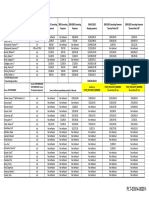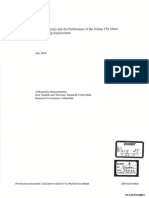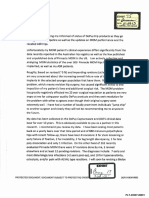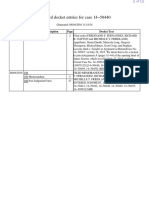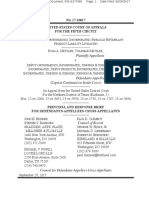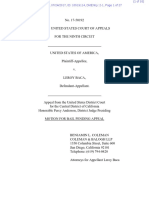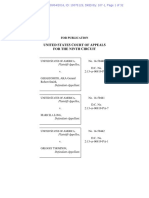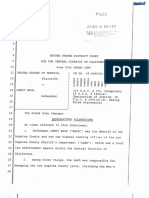Professional Documents
Culture Documents
OCSD Informant Policy
Uploaded by
Lisa Bartley100%(1)100% found this document useful (1 vote)
150 views8 pagesOCSD Informant Policy
Copyright
© © All Rights Reserved
Available Formats
PDF or read online from Scribd
Share this document
Did you find this document useful?
Is this content inappropriate?
Report this DocumentOCSD Informant Policy
Copyright:
© All Rights Reserved
Available Formats
Download as PDF or read online from Scribd
100%(1)100% found this document useful (1 vote)
150 views8 pagesOCSD Informant Policy
Uploaded by
Lisa BartleyOCSD Informant Policy
Copyright:
© All Rights Reserved
Available Formats
Download as PDF or read online from Scribd
You are on page 1of 8
Policy
Orange County Sheriff-Coroner Department
c0}:] ati Manca
Confidential Informants
608.1 PURPOSE AND SCOPE
In many instances, a successful investigation cannot be conducted without the use of
informants. To protect the integrity of the Orange County Sheriff's Department and personne!
using informants, it shall be the policy of this Department to take appropriate precautions by
developing sound informant handling policies.
Confidential informants do not belong to an individual deputy or investigator, but they are agents
of the Department and act on its behalf. As with any case management, it is important to
maintain proper informant management to ensure officer safely, proper legal and ethicel
standards, and to limit civil liability to the Department and the informant handler.
608.2 INFORMANT FILE SYSTEM
The CEEEEEEEEED shall be responsible for maintaining informant files
generated by personne! assigned to the Airport Operations Division, Homeland Security
Division, North Operations Division, Investigations Division and Custody and Court Operations
Command,
The AEE shall be responsible for maintaining informant files
generated by personnel assigned to the Southeast Operations Division and Southwest
Operations Division,
Personnel assigned to the Special investigations Bureau will adhere to the informant handling
policies and procedures as outlined in the Investigations Division, Special Investigations
Bureau, Policy and Procedures Manual.
A separate file shall be maintained on each informant. Blank informant file packets can be
obtained from the Narcotics Unit Supervisors.
608.2.1 FILE SYSTEM PROCEDURE
Each informant file shall be coded with an assigned Informant Control Number (ICN). The
‘Special investigations Bureau Commander will assign the ICN from the Master Control Log. An
informant history shall be prepared to correspond to each informant fle. The informant file shall
contain the following:
a) Completed informant Packet:
4, Informant Cover Sheet
2, Informant Checklist
3. Signed Approval to Operate Informant
4, Informant Personal History
5. Signed Informant Admonishment
FACET HE
6. Signed Informant Agreement
7. Informant Compensation Record
8. Informant Receipt of Payment
9. Informant Update
10. Informant Performance Record
b) Copy of informant’s criminal history (Cll FBI/CCHRS /LARS / warrant checks):
©) Copy of informant’s DMV inquiries to include driver's license and driver history:
8) Informant's photograph and fingerprints (If applicable);
€) Copy of informants arrest report (If applicable);
f) Copy of the Orange County Cooperating Individual Index Card (DA-OCCII). The original
OCCII card shall be forwarded to Orange County District Attorney's Narcotics Enforcement
Team's Cooperating individual Index Coordinator.
The completed informant files shall be maintained and locked in a secure ares (aa
These files shall be used to provide a source of background information
about the informant, enable review and evaluation of information given by the informant and
minimize incidents that could be used to question the integrity of deputies/investigators or the
reliability of the informant.
‘Access to the informant files shail be restricted to the Sherif, the Undershenif, the Investigative
Services Command Assistant Sheriff and Commander, the Investigations Division Captain, the
‘Special Investigations Bureau Commander, the North and South Narcotics Unit Supervisors
and the Informant Handler or their designees.
608.3 USE OF INFORMANTS
Before using an individual as an informant, the deputy/investigator must receive approval from his
or her unit super The deputy/investigator shall compile sufficient information through a
background investigation in order to determine the reliability, credibility and suitability of the
individual; including but not limited to age, maturity and risk of physical harm,
In addition, before using an individual as an informant, the informant packet must be completed
and approved by the Informant Handler's unit supervisor, the proper Narcotics Unit Supervisor
and the Special Investigations Bureau Commander. In the event a new, unsigned informant can
provide information crucial to a major and quickly developing investigation, the informant packet
shall be completed as soon as practical. However, unit supervisor approval is required.
608.3.1 CONFIDENTIAL INFORMANT DEFINITIONS
a) Anytime a person is directed by a deputy/investigator for any reason, whether on one
‘occasion or on a continuous basis, to secure information on criminal activity;
b) Anytime a person requests compensation, either in the form of financial compensation or
any other benefit, for information for any task performed;
c) Anytime a person requests a Letter of Consideration on a pending criminal case.
PRSETOTE
608.3.2 TYPES OF INFORMANTS
Confidential Informant
A Confidential Informant formant who requests to remain confidential, has yet to be
tested and has usually not previously worked for law enforcement. This type of informant usually
provides information for compensation.
Confidential Reliable Informant
A Confidential Reliable Informant is an informant whose reliability and credibility have already
been established. The information given in the past was proven truthful and reliable, either on
‘one occasion or on numerous occasions. Information received from a Confidential Reliable
Informant of another law enforcement agency, through that agency, is deemed reliable,
Criminal Informant
A Criminal Informant is a person who has a criminal history and is usually motivated for
Personal reasons. The informant may be acting out of revenge or for monetary compensation.
Defendant Informant
‘A Defendant Informant is an informant who has a pending criminal matter, including probation
and/or parole violations. A Defendant Informant also includes an individual who has been
prosecuted, convicted and is awaiting sentencing. A Defendant Informant provides information
in exchange for a benefit or consideration, such as a Letter of Consideration, in their pending
criminal matter.
In-Custody Informant
‘An In-Custody Informant is an inmate who provides information or testifies about matters
another inmate/defendant told him/her while both inmates were in custody, either at the
direction of a deputylinvestigator or for any type of benefit or consideration. Inmates who
provide information about inmate activity, such as pending assaults, gang affiliations and
arcoties smuggling, and who receive a benefit or any type of consideration, are considered In-
Custody Informants.
Citizen Informant
A Citizen Informant is @ person who regularly or frequently provides information, outside the
scope of their employment, to law enforcement. The Citizen Informant is motivated by a sense
of good citizenship, not by benefit or consideration, and may act under the direction of a deputy
‘or investigator. A Citizen Informant's information is automatically considered reliable without
additional corroboration, A Citizen Informant may or may not choose to be confidential.
Citizens calling in or appearing in-person to provide information concerning criminal activity are
not considered informants, as they are not acting at the direction of a law enforcement officer.
Anonymous Informant
Anonymous Informants are those individuals who refuse to identify themselves to law
‘enforcement and their identity is not known. An Anonymous Informant is not a Citizen Informant
and the information given may or may not be reliable. An Anonymous Informant does not fall
under the requirements of this policy.
608.4 INFORMANTS REQUIRING SPECIAL REVIEW
‘Some persons being considered for use as informants may require special review for approval
before being activated. These include juveniles, persons on probation or parole, or those who
holt privileged positions, e.g., attorneys, doctors, clergy, reporters, persons in the Witness
Protection Program and former law enforcement officers.
PRETHE
Persons on probation or parole present specific concerns. The Department cannot place a
probationer or parolee in @ position that violates the terms or conditions of their probation or
parole. The Department has no authority to usurp the conditions set forth by @ court or the
authority of the controlling agency.
Guidance from County Counsel and the Orange County District Attorney's Narcotics
Enforcement Team should be sought when persons of privileged status are being considered
for use as informants,
608.4.1 INFORMANTS ON COUNTY PROBATION
The handling deputy/investigator shall determine if the person is on Summary (Informal)
Probation or Formal Probation. if the person is on Formal Probation the handling
deputy/investigator shall do the following:
a) Contact the court or probation officer to determine if the informants use will not violate the
conditions of their probation;
b) Document the concerns if notification will jeopardize a major case investigation.
If the use of the informant is in conflict with the terms of their probation, the handling
deputylinvestigator can attempt to amend the terms of probation through the court. If the court
requests written documentation, the handling deputy/investigator will submit the request on
Department letterhead with the proper Departmental approvals. A request should be made with
the court to refrain from placing @ copy of the letter in the probationer’s file to preserve the
confidentiality of the informant.
608.4.2 INFORMANTS ON FEDERAL PROBATION
The handling deputy/investigator shall contact the person's probation officer. Federal
probationers can only be used as informants when the court of jurisdiction has been formally
contacted and approved for use. A formal request to use a federal probationer as an informant
shall be made on Department Letterhead with the proper Departmental approvals. If the
request is approved, the probation officer will complete and submit the necessary paperwork to
the concerned federal court for approval.
608.4.3 INFORMANTS ON STATE PAROLE
‘The handling deputy/investigator shall contact the appropriate state agent to request to use the
parolee as an informant. The name of the agent contacted will be documented on the Cl
History form. If a written request is made by the agent, the handling deputyinvestigator will
submit the request on Department letterhead with the proper Departmental approvals,
describing in general details the activity in which the parolee will be used, the duration of use
and any anticipated travel,
608.4.4 INFORMANTS ON FEDERAL PAROLE
Currently, the United States Parole Commission discourages the use of federal parolees as
informants. If the use of a federal paroles is essential in a major case, the Assistant Sheriff
‘commanding the Investigative Services Command shall submit a written request to the
Chairperson of the United States Parole Commission for the use of that informant. If the
Commission approves the request, the informant may be used for only 90 days. Extensions
may only requested by the Assistant Sherif through the Commission.
608.4.5 JUVENILE INFORMANTS
The use of juvenile informants under the age of 13-years is prohibited. Except as provided for in
the enforcement of the Tobacco Enforcement Act, Business & Professions Code Section
PASETAS
22960, et seq,, the use of any juvenile informant between the ages of 13 and 18-years is only
authorized by court order obtained pursuant to Penal Code Section 701.5.
For purposes of this policy, a “juvenile informant" means any juvenile who participates, on
behalf of this Department, in a prearranged transaction or series of prearranged transactions
with direct face-to-face contact with any party, when the juvenile's participation in the transaction
{s for the purpose of obtaining or attempting to obtain evidence of illegal activity by a third party
and where the juvenile is participating in the transaction for the purpose of reducing or
dismissing a pending juvenile petition against the juvenile.
608.5 GUIDELINES FOR HANDLING INFORMANTS
All informants are required to sign and abide by the provisions of the Department Informant
‘Admonition form. The deputy/investigator using the informant shall discuss each of the
provisions of the agreement with the informant. Details of the agreement are to be approved in
writing by the unit supervisor before being finalized with the informant.
Members of the Department shell not make any promises or representations, express or
implied, to any informant regarding his or her pending criminal matters, or those of any other
person(s), without the concurrence of the OCI Coordinator.
608.5.1 RELATIONSHIPS WITH INFORMANTS
No member of the Orange County Sheriff's Department shall knowingly maintain a social
relationship with an informant while off duty, or otherwise become intimately involved with an
informant. Members of the Orange County Sheriff's Department shall neither solicit nor accept
gratuities nor engage in any private business transaction with an informant.
To maintain officerfinformant integrity, the following must be adhered to:
a) Deputies/investigators shall not withhold the identity of an informant from their superiors;
b) Identities of informants shall otherwise be kept confidential;
©) Criminal activity by informants shall not be condoned:
4) Informants shall be told they are not acting as police officers, employees or agents of the
Orange County Sheriff's Department and that they shall not represent themselves as such;
€) The relationship between deputies/investigators and informants shall always be ethical
and professional;
f) Social contact shall be avoided unless necessary to conduct an official investigation, and
only with prior approval of the Narcotics Unit supervisor,
9) Deputies/investigators shall not meet with informants of the opposite sex in a private place
unless accompanied by at least one additional deputy/investigator or with prior approval of
the Narcotics Unit Supervisor. When contacting informants of either sex for the purpose of
making payments officers shall arrange for the presence of another deputy/investigator,
h) In all instances when Department funds are paid to informants, a voucher shall be
completed in advance itemizing the expenses.
608.6 INFORMANT CONSIDERATION AND BENEFITS.
A benefit includes any consideration or advantage an informant was offered, promised or
received in exchange for information or testimony provided. It includes a benefit for the
PACES STE
informant or a benefit for another person at the informant's request. Any and all benefits and
consideration given to an informant will be recorded and documented in the informant's file.
Consideration and benefits include, but are not limited to, the following:
* Financial — Monetary payments of any kind including, but not limited to, room and
board, payment of debts, cash, meals, use of vehicles, cell phone bills or other
informant expenses,
Release from custody — Leniency in an arrest or booking, assistance with an own-
recognizance (OR) release or request for a lowering of bail
Charging leniency - Leniency shown in the filing of charges and enhancements,
including the non-fiing of charges.
Delay — Continuances in arraignment, pre-trial motions and sentencit
Dispostion = Dismissal or reduction in charges, custody time, probation lems or
favorable input by @ deputy district attorney or investigation deputy/investigator made
directly to the court.
Favorable intervention ~ Favorable action taken on behalf of the informant with other
governmental agencies, such as the Department of Motor Vehicles, the Department of
Homeland Security, or employers.
* In custody ~ A change in housing location, non-collect phone calls, extended visits,
extra jail issue, extra food or placing money in an informant's jail account.
= Immunity
608.6.1 INFORMANT PAYMENT PROCEDURES
The potential payment of large sums of money to any informant must be done in a manner
respecting public opinion and scrutiny. Additionally, to maintain a good accounting of such funds
requires a strict procedure for disbursements.
608.6,2 PAYMENT FORMULA
‘The amount of funds to be paid to any informant will be evaluated against the following criteria:
The Informant Handler will discuss the above factors with the Narcotics Unit Supervisor and
arrive at @ recommended payment. The fee paid to an informant will be based on the type of
information given and to what extent the information given assists in an investigation.
608.6.3 CASH DISBURSEMENT POLICY
The following establishes a cash disbursement policy for informants. No informant will be told in
advance or given an exact amount or percentage for services rendered.
PACES FE
608.64 PAYMENT PROCESS
Fees paid to informants and expenditures incurred during investigations shall comply with the
following limitations and authorizations.
Informant fee limits:
$1 - $500 —_Narcotics Unit Supervisor approval
$501 _- $1,500 Special investigations Bureau Commander approval
$1,501- $3,500 _ Investigations Division Captain approval
$3,501 + Investigative Services Commander or Assistant Sheriff approval
Upon payment to the informant, the Narcotics Unit Supervisor shall complete an expense
voucher. The Narcotics Unit Supervisor will give the payment amount to the Informant Handler.
‘The deputylinvestigator shall write the voucher number on the informant Payment Receipt form.
The voucher copies will be disbursed in the proper manner and the Informant Payment Receipt
form will be placed in the informant file.
To complete the transaction, the Informant Handler and witness will pay the informant. The
informant will sign the Receipt of Payment form indicating the amount received, the date
received and the names of the deputies/investigators he/she received the funds from. The
Informant Handler and witnessing deputy/investigator shall sign the Receipt of Payment form.
The signed form shall be placed in the informants file.
If the payment amount exceeds $499.00, a statement of the informants involvement in the case
shall be memorialized on an Internal Memorandum, addressed to the Special Investigations
Bureau Commander, and placed in the informant's file.
Each informant receiving @ cash payment shail be informed of his or her responsibility to report
the cash to the Internal Revenue Service (IRS) as income.
608.7 _ INACTIVATING INFORMANTS
Informants may be inactivated at any time. There are several reasons detailed in the Informant
Update form. When the handling deputy/investigator determines the informant should be
inactivated, he/she will submit a Informant Update form stating the reason and submit it to the
Narcotics Unit Supervisor for his/her approval. If approved, the unit supervisor will place the
informant packet into the “inactive” file. Inactive files will be kept for three (3) years and then
destroyed.
When an investigator suspects that an informant is undesirable or unreliable, the handling
deputy/investigetor will complete the Informant Update form checking the unreliable box stating
the reason, then submit it to the Narcotics Unit Supervisor for approval. If approved, the form
will be placed in the beginning of the informant packet and the packet will be placed into the
Undesirable/Unreliable file.
The investigator will then notify the informant as to. their change in status and make it clear to
the informant he/she will no longer be providing services to the Department. The Special
Investigations Bureau Commander will be advised and the proper notation will be made in the
Master Informant Control Log.
PAGET OAS
608.8 NOTIFICATION TO THE DISTRICT ATTORNEY
It Is essential that deputies and investigators inform the District Attorney's Office when a case
involves an informant in any capacity. This is vital in order to ensure the proper evaluation of
discovery and any Brady (Brady v. Maryland (1963) 373 US 83, at p. 87) issues at the earliest
possible time, and to determine the best effective fling strategy. For example, ifthe information
is known by the filing District Attorney, a case may be filed differently to better protect and
ensure the confidentiality of the informant.
608.9 _IN-CUSTODY CONFIDENTIAL INFORMANTS
Confidential informants and operations involving informants within the Custody and Court
Operations Command will adhere to the additional informant policies and procedures as
outlined in the Custody and Court Operations Manual (C.C.O.M) section 1202.7.
608.10 INFORMANT AUDITS
Informant file audits will be performed on a yearly basis by the Special Investigations Bureau
‘Commander. The Narcotics Unit Supervisors will obtain all updated material and information
from the deputies and investigators who manage the informants. The Narcotics Unit Supervisor
will review the material for completeness and thoroughness prior to the audit and sign the
Informant Update Sheet. The approved form and material will be forwarded to the Special
Investigations Bureau Commander for approvel. The Special Investigations Bureau
Commander will place the update form and material into the informant packet file.
The Special Investigations Bureau Commander will ensure all informant files in the “active file”
are up to date, The Special Investigations Bureau Commander will also review those informant
packets in the “inactive file.” Those that have not been active for three (3) years will be
destroyed.
Information/action to be included in the yearly audit will include:
a) Informant Update Form;
b) Updated copy of criminal history (CIl/FBVCCHRS/LARSiwarrant checks);
©) Updated copy of DMV inquiries to include driver's license and driving history;
4) Informant Performance Record;
€) Informant Compensation Record and Receipt of Payment Form;
f) Copy of Letter(s) of Consideration, if appropriate;
9) New informant photograph if older than two (2) years.
h) _Informants who have been active for twelve (12) or more months shall be interviewed by
the corresponding unit supervisor. The supervisor shail ensure the informant Is fully aware
of the terms of the Informant Agreement and the Informant Admonishment. The supervisor
shall discuss the informant's affiliation with his/her informant handler and the Department,
‘and confirm the procedures set forth within this policy are being followed.
aes PACES TE
You might also like
- The Subtle Art of Not Giving a F*ck: A Counterintuitive Approach to Living a Good LifeFrom EverandThe Subtle Art of Not Giving a F*ck: A Counterintuitive Approach to Living a Good LifeRating: 4 out of 5 stars4/5 (5794)
- LASD Beating Convictions Upheld by 9th CircuitDocument35 pagesLASD Beating Convictions Upheld by 9th CircuitLisa BartleyNo ratings yet
- The Little Book of Hygge: Danish Secrets to Happy LivingFrom EverandThe Little Book of Hygge: Danish Secrets to Happy LivingRating: 3.5 out of 5 stars3.5/5 (399)
- Tally BillDocument5 pagesTally BillLisa BartleyNo ratings yet
- A Heartbreaking Work Of Staggering Genius: A Memoir Based on a True StoryFrom EverandA Heartbreaking Work Of Staggering Genius: A Memoir Based on a True StoryRating: 3.5 out of 5 stars3.5/5 (231)
- 12-18-15 - Niedernhofer Vs DePuy J&J - Wrongful Death PDFDocument33 pages12-18-15 - Niedernhofer Vs DePuy J&J - Wrongful Death PDFLisa BartleyNo ratings yet
- Hidden Figures: The American Dream and the Untold Story of the Black Women Mathematicians Who Helped Win the Space RaceFrom EverandHidden Figures: The American Dream and the Untold Story of the Black Women Mathematicians Who Helped Win the Space RaceRating: 4 out of 5 stars4/5 (894)
- 2010 Email From Dr. Andy Engh To DePuy's Paul BermanDocument2 pages2010 Email From Dr. Andy Engh To DePuy's Paul BermanLisa BartleyNo ratings yet
- The Yellow House: A Memoir (2019 National Book Award Winner)From EverandThe Yellow House: A Memoir (2019 National Book Award Winner)Rating: 4 out of 5 stars4/5 (98)
- DePuy Payments To Pinnacle & Ultamet Hip Design SurgeonsDocument2 pagesDePuy Payments To Pinnacle & Ultamet Hip Design SurgeonsLisa BartleyNo ratings yet
- Shoe Dog: A Memoir by the Creator of NikeFrom EverandShoe Dog: A Memoir by the Creator of NikeRating: 4.5 out of 5 stars4.5/5 (537)
- DePuy Investigation Into Ultima Metal-On-Metal HipsDocument58 pagesDePuy Investigation Into Ultima Metal-On-Metal HipsLisa BartleyNo ratings yet
- Elon Musk: Tesla, SpaceX, and the Quest for a Fantastic FutureFrom EverandElon Musk: Tesla, SpaceX, and the Quest for a Fantastic FutureRating: 4.5 out of 5 stars4.5/5 (474)
- Mold Inspection ReportDocument22 pagesMold Inspection ReportLisa BartleyNo ratings yet
- Never Split the Difference: Negotiating As If Your Life Depended On ItFrom EverandNever Split the Difference: Negotiating As If Your Life Depended On ItRating: 4.5 out of 5 stars4.5/5 (838)
- Rackauckas FPPC ComplaintDocument1 pageRackauckas FPPC ComplaintLisa Bartley100% (1)
- Grit: The Power of Passion and PerseveranceFrom EverandGrit: The Power of Passion and PerseveranceRating: 4 out of 5 stars4/5 (587)
- DR Fehring Powerpoint Metal-On-Metal, How Did We Get HereDocument55 pagesDR Fehring Powerpoint Metal-On-Metal, How Did We Get HereLisa BartleyNo ratings yet
- Devil in the Grove: Thurgood Marshall, the Groveland Boys, and the Dawn of a New AmericaFrom EverandDevil in the Grove: Thurgood Marshall, the Groveland Boys, and the Dawn of a New AmericaRating: 4.5 out of 5 stars4.5/5 (265)
- 12-18-15 - Niedernhofer Vs DePuy J&J - Wrongful Death PDFDocument33 pages12-18-15 - Niedernhofer Vs DePuy J&J - Wrongful Death PDFLisa BartleyNo ratings yet
- 2008 DePuy Complaint CrisisDocument42 pages2008 DePuy Complaint CrisisLisa BartleyNo ratings yet
- 2016 Department of Health & Human Services Report On Cobalt IonsDocument8 pages2016 Department of Health & Human Services Report On Cobalt IonsLisa BartleyNo ratings yet
- The Emperor of All Maladies: A Biography of CancerFrom EverandThe Emperor of All Maladies: A Biography of CancerRating: 4.5 out of 5 stars4.5/5 (271)
- Why Hips Fail by Graham Isaac - End Game MemoDocument7 pagesWhy Hips Fail by Graham Isaac - End Game MemoLisa BartleyNo ratings yet
- On Fire: The (Burning) Case for a Green New DealFrom EverandOn Fire: The (Burning) Case for a Green New DealRating: 4 out of 5 stars4/5 (73)
- 2010 Email From Dr. John Irving To DePuy's Paul BermanDocument3 pages2010 Email From Dr. John Irving To DePuy's Paul BermanLisa BartleyNo ratings yet
- The Hard Thing About Hard Things: Building a Business When There Are No Easy AnswersFrom EverandThe Hard Thing About Hard Things: Building a Business When There Are No Easy AnswersRating: 4.5 out of 5 stars4.5/5 (344)
- 2007 DePuy DPA DismissedDocument1 page2007 DePuy DPA DismissedLisa BartleyNo ratings yet
- Team of Rivals: The Political Genius of Abraham LincolnFrom EverandTeam of Rivals: The Political Genius of Abraham LincolnRating: 4.5 out of 5 stars4.5/5 (234)
- 2011 Johnson & Johnson Deferred Prosecution AgreementDocument38 pages2011 Johnson & Johnson Deferred Prosecution AgreementLisa BartleyNo ratings yet
- 2007 Deferred Prosecution Agreement - USA vs. DePuyDocument26 pages2007 Deferred Prosecution Agreement - USA vs. DePuyLisa BartleyNo ratings yet
- 4-8-11 - Johnson & Johnson Press Release Announces Settlement With U.S. Department of Justice and SECDocument2 pages4-8-11 - Johnson & Johnson Press Release Announces Settlement With U.S. Department of Justice and SECLisa BartleyNo ratings yet
- USA Vs DePuy - 2007 Criminal ComplaintDocument2 pagesUSA Vs DePuy - 2007 Criminal ComplaintLisa BartleyNo ratings yet
- DePuy Payments To Pinnacle & Ultamet Hip Design SurgeonsDocument2 pagesDePuy Payments To Pinnacle & Ultamet Hip Design SurgeonsLisa BartleyNo ratings yet
- The Unwinding: An Inner History of the New AmericaFrom EverandThe Unwinding: An Inner History of the New AmericaRating: 4 out of 5 stars4/5 (45)
- LASD Appeal Denied - Unpublished Opinion 8-4-16Document31 pagesLASD Appeal Denied - Unpublished Opinion 8-4-16Lisa BartleyNo ratings yet
- The World Is Flat 3.0: A Brief History of the Twenty-first CenturyFrom EverandThe World Is Flat 3.0: A Brief History of the Twenty-first CenturyRating: 3.5 out of 5 stars3.5/5 (2219)
- DePuy Appeals Verdict in California CasesDocument98 pagesDePuy Appeals Verdict in California CasesLisa BartleyNo ratings yet
- 7-24-17 - Baca Appeal To 9th On BailDocument93 pages7-24-17 - Baca Appeal To 9th On BailLisa BartleyNo ratings yet
- LASD Appeals Denied 8-4-16 - Published OpinionDocument32 pagesLASD Appeals Denied 8-4-16 - Published OpinionLisa BartleyNo ratings yet
- The Gifts of Imperfection: Let Go of Who You Think You're Supposed to Be and Embrace Who You AreFrom EverandThe Gifts of Imperfection: Let Go of Who You Think You're Supposed to Be and Embrace Who You AreRating: 4 out of 5 stars4/5 (1090)
- 5-13-16 - Judicial Notice of Baca Plea DealDocument25 pages5-13-16 - Judicial Notice of Baca Plea DealLisa BartleyNo ratings yet
- 8 5 16 Leroy Baca IndictmentDocument15 pages8 5 16 Leroy Baca IndictmentLisa BartleyNo ratings yet
- 7-18-16 - Leroy Baca Sentencing HearingDocument48 pages7-18-16 - Leroy Baca Sentencing HearingLisa BartleyNo ratings yet
- DA Charge Evaluation Worksheet - Baca & TurnerDocument23 pagesDA Charge Evaluation Worksheet - Baca & TurnerLisa Bartley100% (1)
- The Sympathizer: A Novel (Pulitzer Prize for Fiction)From EverandThe Sympathizer: A Novel (Pulitzer Prize for Fiction)Rating: 4.5 out of 5 stars4.5/5 (119)
- 5-20-16 - Joint Reply Six LASD Defendants - AppealDocument97 pages5-20-16 - Joint Reply Six LASD Defendants - AppealLisa BartleyNo ratings yet
- Her Body and Other Parties: StoriesFrom EverandHer Body and Other Parties: StoriesRating: 4 out of 5 stars4/5 (821)









